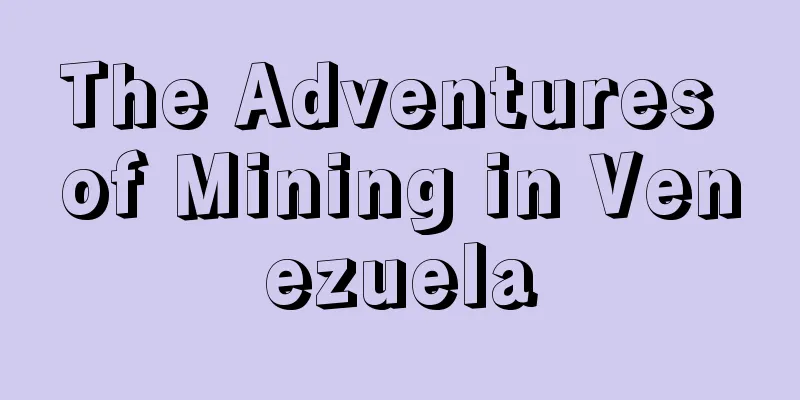The Adventures of Mining in Venezuela

|
“Is anyone going to Venezuela to mine?” A comment from a group member broke the tranquility of the mining circle exchange group. "My friend just came back from there. I strongly advise not to go there. His machine was stolen and he almost lost his life." "Electricity is free in that place, but life is charged." "It's better to steal electricity in the country. At most you'll go to jail, but you won't lose your life." … The responses from other group members revealed the dangers of mining in Venezuela. In fact, there were reports earlier last year that being a miner in Venezuela is a miserable life, with blackmail, kidnapping, and confiscation of mining machines being an almost unavoidable fate. So what is the situation in Venezuela today? The story begins in the past. 01 From rich to poorIn the 1950s, many Venezuelans could not help but sigh that this was a paradise on earth. People had no worries about food or clothing, and their lives were rich and secure. At that time, World War II had just ended, and most countries in the world were struggling to recover from the ruins. Venezuela's per capita GDP ranked fourth in the world. At that time, Venezuela was 13 times richer than China. Until the early 1980s, Venezuela was still the richest country in Latin America, with the highest wage level in Latin America. At that time, it already had its own social welfare system including medical care, education, food subsidies, etc. As a country with the richest oil reserves in the world, Venezuela can live well just by selling oil. However, Venezuela's economy is too single. As it has always been heavily dependent on the export of domestic crude oil and has not achieved diversified development, its economy will always be greatly impacted whenever international oil prices fall. In the mid-1980s, an oversupply of crude oil and a sharp drop in oil prices nearly brought Venezuela's economy to the brink of collapse. In 1998, Chavez won the presidential election. His slogan was "improving the living standards of the people", but he still relied on Venezuela's abundant oil reserves and did not change Venezuela's single development model. Fortunately, Venezuela escaped the disaster when oil prices recovered. After Chavez's death, international oil prices fell again in 2014. This time, Venezuela's economy suffered a devastating blow and has never recovered since then. As soon as his successor, President Maduro, came to power, he was mired in an economic collapse and even began to face a political crisis. According to data released by the Venezuelan opposition parliament in 2018, the country's consumer price index in June 2018 surged 46,305% year-on-year. The month-on-month inflation rate also accelerated to 128.4%, with food prices soaring 183%. In this way, Venezuela has fallen from a country with the richest oil reserves to a place with the most serious inflation, and from a paradise on earth to hell. 02The controversial "petrocoin"In order to resist inflationary pressure, some areas in Venezuela even use Bitcoin to replace the payment and transfer functions of legal currency. Venezuela made a bold attempt at the end of 2017. On December 8, President Maduro proposed the idea of issuing the country's legal digital currency Petro (Petro), and the government issued the "Petro White Paper" at the end of January 2018. According to Maduro, issuing Petro will help Venezuela break the U.S. financial blockade, maintain its monetary sovereignty, and promote its macroeconomic stability. The market value of Petro will also surpass Bitcoin and become the largest cryptocurrency. As the first country in the world to issue legal cryptocurrency, Venezuela has attracted global attention, but the Petro has been controversial because its symbolic significance is greater than its practical significance. It can also be said that Venezuela's blockchain process is centered around the Petro, with few other applications and no practical problems solved. According to Chain Tower Think Tank, due to the currency depreciation of more than 90%, Venezuelans choose to trade in Bitcoin. From March to April 2018, the Bitcoin trading volume denominated in Venezuelan Bolivar surged by 138%, and from April to May it increased by 39%. In the first week of June, the Bitcoin trading volume increased by 40% month-on-month. In the context of using Bitcoin to solve the most basic problems in life, the practical application of blockchain in Venezuela is out of reach. However, the Venezuelan government has taken drastic measures to promote the Petro. It has formulated a youth digital work plan to encourage young citizens, including college students, the unemployed, single mothers and the homeless, to set up cryptocurrency farms to mine Petro. At the same time, it has also implemented measures to crack down on citizens mining Bitcoin. Since June 2018, the Venezuelan government has banned the import of any new mining hardware, including certain models of graphics cards and computers as well as ASIC mining machines, in order to crack down on domestic mining operations, support the local currency, and prevent citizens from completely abandoning the country's legal currency, the Bolivar. Venezuela is the country with the lowest mining cost in the world. Data shows that the cost of mining one Bitcoin is only more than 500 US dollars, but mining is not feasible in Venezuela. In addition to the policy reasons that prohibit Bitcoin mining in Venezuela, the reasons for its impracticability are also due to electricity problems on the one hand and unstable political factors on the other. 03Large-scale power outages occurred one after anotherAlthough Venezuela has low electricity prices, there is a power shortage and power outages are possible at any time, making it unsuitable for mining. Starting from the evening of March 7 this year (local time), most parts of Venezuela, including the capital Caracas, experienced power outages for more than 24 hours. At one point, 20 of Venezuela's 23 states experienced a complete power outage. The power outage caused the Caracas subway to be unable to operate, resulting in large-scale traffic jams. Schools, hospitals, factories, airports, etc. were severely affected, and mobile phones and the Internet could not be used normally. In the early morning of the 8th, power supply began to be restored in some areas of Caracas, and then power supply in other areas was gradually restored. However, power outages occurred again at noon on the 9th and on the 10th, causing great panic among people. The long-term and large-scale power failure has caused serious losses to Venezuela, including suspension of work and school for several consecutive days, inaccessibility of some websites, and even serious looting in shopping malls and supermarkets in some areas. This power outage is the longest and most extensive power outage in Venezuela since 2012. However, when people have not yet completely recovered from the panic of the power outage, the power outage in Venezuela occurred again. According to a BBC report on March 25, Venezuela suffered another large-scale power outage on Monday, resulting in communication loss in many areas, which caused widespread concern among local residents about the situation. The power outage occurred after 1 p.m. local time. The large-scale power outage, which lasted only a few hours, once again plunged Venezuela's capital Caracas into darkness and affected 16 of Venezuela's 23 states. We don’t know when the next power outage will occur, but it goes without saying that large-scale power outages often occur in Venezuela. There are three main criteria for choosing electricity for mining: legal electricity, stable electricity, and cheap electricity. Electricity in Venezuela is very cheap, but it is neither stable nor legal. Although mining requires cheap electricity, legality and stability must also be taken into consideration. 04Unstable political factorsIn addition, unstable political factors also determine that Venezuela does not have an environment for mining. Since the Venezuelan president does not want to be controlled by the United States, he has been holding up the banner of "anti-Americanism". Naturally, the United States also regards Venezuela as a thorn in its side and maintains sanctions against it. Public information shows that the United States has recently continued to increase its economic sanctions on Venezuela, including prohibiting U.S. financial institutions from participating in new debt and equity transactions of the Venezuelan government and the state-owned Venezuelan Oil Company, and prohibiting U.S. institutions from participating in some bond transactions currently issued by the Venezuelan public sector. Regarding the Petro, a spokesman for the U.S. Treasury Department once warned investors that if they subscribed to the Petro, they would risk violating U.S. sanctions against the Venezuelan government and being punished. According to reports, on March 13, an official press release issued by the U.S. Treasury Department also stated that the U.S. Treasury Department has added Moscow's Evrofinance Mosnarbank to the sanctions list, calling it the main international financial institution providing funding for Venezuela's petro. In a press release, the U.S. Treasury accused Evrofinance, which is jointly owned by Russian and Venezuelan state-owned companies, of providing substantial assistance in launching the petro, calling it a "failed" project. The U.S. government has been imposing tough sanctions on Venezuela's oil industry in an attempt to push Maduro out of power and has called on Venezuela's military leaders to abandon him, media reports said. Maduro has denounced the sanctions as U.S. interventionism and won diplomatic support from Russia. Recently, Maduro said that Russia would deliver medicine to Venezuela, but did not specify how it would arrive, adding that Russia had sent about 300 tons of humanitarian aid in February. Reports also said two Russian Air Force planes landed at Venezuela's national airport on Saturday, carrying Russian defense officials and nearly 100 troops. 05What’s the use of money if you’ve lost your life?Maslow's theory divides needs into five categories from low to high: physiological needs, safety needs, social needs, respect needs and self-actualization needs. When people's most basic needs are not met, all other needs are empty talk. Today, Venezuelans are living in dire straits, eating garbage and small animals... and personally performing various inflation "spectacles". Ordinary people can barely make ends meet, so how can mining machines and Bitcoin be high-priced products that they can afford? Being a miner in Venezuela is a daily dread, with people always worried that "vampires" will come to extort money and eventually threaten their personal safety. In Venezuela, mining is a privilege reserved for a select few. "Foreigners who go to Venezuela with wealth will return empty-handed. They will be lucky if they don't lose their lives. What is the purpose of living in this world? What's the use of money if you lose your life?" said Mr. Li, a miner who just returned from Venezuela, with lingering fear. Mr. Li also said: "Because the local government has severely cracked down on private mining, mining is like stealing. One day, many police came to the mine run by my friend and I. My friend was arrested by the police and asked me to collect money to pay the 'fine'. I finally collected the money and paid it to redeem my friend, but I only had peace for a short time." "A few days later, many policemen came again. This time, they confiscated all the mining machines without saying a word. All the mining machines were taken away, leaving nothing behind. My friend tried to stop them but was pushed aside. If I hadn't stopped them, we would have probably had a conflict and we would have been the ones to suffer. Judging from the aggressiveness of their attack, we might not be able to come back. It was a helpless matter and we had to swallow our anger. These vampires are simply amazing. " He continued. Industry insiders said that there are too many unstable factors in mining in Venezuela, which is completely unsuitable for mining. Don't suffer a big loss just because of cheap electricity. As described in Lieyun Finance's previous article "Denying entry to Qinghai, Iran and Sichuan, he said "I am playing a big game of chess", Venezuela is not a place where one can "place a move". Source: Lieyun Finance Author: Meng Yue Original title: "Venezuela's horror continues, "vampires" are still rampant" |
>>: How Can Binance Recover the Lost 7,000 Bitcoins?
Recommend
What kind of women are likely to become "leftover women"
The so-called leftover women refer to old girls w...
How to read the life line in palmistry
Among our palm lines, the life line, emotion line...
Is it a good fate for a man to have a mole on the right side of his chin? What are the impacts?
Traditional physiognomy covers a wide range, among...
What does the depth of the philtrum represent?
The depth of a person's philtrum will also re...
Is it good or bad to have a mole in the left eyebrow? What does a mole in the left eyebrow mean?
There are many factors that affect people's p...
Facial features of people with a strong sense of crisis
If you don't think about the future, you will...
What are the celebrities with broken palms?
A broken palm is a special line on our palm. Amon...
Where the mole grows determines your fate
Where the mole grows determines your fate Mole lo...
What kind of women are prone to cheating? What kind of women don't take relationships seriously?
Some people think that good-looking women are pro...
Is it good to have a mole on the thigh? What does a mole on a woman's inner thigh mean?
Moles not only appear in bright places, but also ...
Why is PGone, a "clear stream" in the hip-hop world, now surrounded by negative news?
Some people's success depends on talent, some...
A man without a career line on his palm indicates an unstable job throughout his life
Is it good for a man to not have a career line on...
What does a woman with sunken eyes look like?
The eyeball can not only show emotions, but also ...
In less than 10 days, LTC may see a 73% waterfall drop
After the bear market in 2018, no one would doubt...
How to read the ten most evil palm lines
Palmistry can not only tell a person's fortune...









